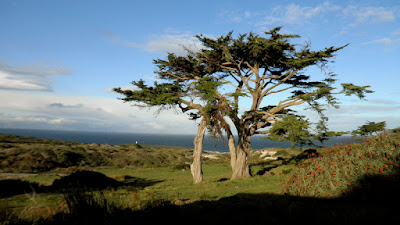
When I first arrived in South Africa, I was intent on not having electricity. I told my program director at both of my in-country placement interviews that I did not want running water or electricity. As per my request, I was originally told that my site wasn’t going to have electricity or running water [see Ngiyanibingelela (Literally - Greetings!)]. To my chagrin, when I finally arrived at my house in Magaga, my family had installed a single, ungrounded outlet along with an in-line light bulb. As it turns out, my village only had electricity installed a few months before I arrived and Peace Corps was still in the dark about the electrification of my village. Excuse the pun, I couldn’t resist. Now, I’m at peace with my electricity situation. I am only slightly jealous of PCVs without electricity but I’m not bitter. I honestly only use electricity to power a 2-burner hot plate, a light bulb and my computer/phone.
As I have mentioned in previous posts, I work in two separate communities pretty far apart from each other (at least to walk between). The community I live in is electrified. This means that everyone in my village, for the most part, has interacted with light bulbs, electric kettles and refrigerators. The school I work in has computers, a photocopying machine and lights in the classrooms. The learners get copied tests, homework assignments and things generally move at a faster pace. My other community, however, has not had electricity since I’ve been here. People purchase candles to light their rondavels at night, they heat water by fire and never slaughter an animal they won’t be able to fully consume within a day or two. It’s a very strenuous life. At school, we use a generator to power the risograph machine (don’t get me started on this electronic printing press contraption), to power the Administrative Clerk’s laptop and we completely rely on the sun to provide enough light to illuminate the classrooms. Learners are constantly copying paragraphs off of the board, tests take much longer and the pace of work is considerably slower because everything takes longer to complete.
Within the past month, Eskom (the electrical supply company)... has started to erect poles and run electrical wire all over the village that currently doesn’t have electricity. They have even installed a power box within the premises of the school, which means we will soon have electricity! When I first arrived in South Africa I thought about electricity in probably the exact same fashion that you are thinking about it now. It doesn’t seem like such a complicated thing. Here, however, I have seen that living with electricity for the first time ever has presented some problems. South Africans who are not used to having electricity don’t understand why turning off lights when they leave a room or why shutting off a TV when they’re not watching it is important/thrifty. I have literally walked into a house where all of the lights and the TV were on, even though no one was there. Naturally, I turned everything not in use off. Not 10 minutes later, the family gets back and immediately turns on all of the lights and the TV, which they still didn’t watch. In a developing country where electricity is just starting to be made accessible, there is a huge learning curve.
I was talking with an elder the other day in my village (I had an intermediary translator) and asked him all about his perceptions of how electricity has affected the village. He told me that he though it was one of the best things to happen to his community, but right before Eskom came out to install the infrastructure a few of the village leaders called a town meeting about the entire electrification situation. As it turned out, a few members of the community were concerned that an influx of electricity would have a very negative impact on their lives. Of particular concern to them were families installing exterior lights. They were concerned that if families had lights on all night that their cows wouldn’t be able to sleep and would eventually die from exhaustion. In a community where wealth is measured in livestock, it was a serious concern. The elder then told me that he stood up and said, “Well how about we just install it at my place and then if others want it, they can get it installed next year?” It’s certainly a comical misconception but his story provides a perfect example of how much we take for granted when we don’t think about the tiny marvels in our life.
On top of that, I have noticed that there is a difference in English language acquisition between the learners in my two communities. The learners who have access to TV, computers and photocopied worksheets seem to become more proficient faster than the learners who have extremely limited exposure. When they are exposed to the official South African medium of instruction and business more often, they are more successful at learning and using English. Not only has the technology of electricity altered the way people live, it also seems to be providing a tangible, measurable benefit to the education of South Africans.
Looking backwards on my experience with electricity in the States, it seemed like a naturally integrated system of life – something that has always existed. Now that I have experienced life without it, I can more fully appreciate the advantages that electricity has given me in my life. I am definitely excited to see how my community reacts and adapts to this new technology in their lives. It should be interesting, to say the least!
Enough about that now, though. Below are some pictures from my past month in Cape Town and around my site in South Africa. Enjoy!
Ngiyanikhombisa izinto ezincane,
Mvelo Sigubudu
Living the little things,
Chad Wolver


















